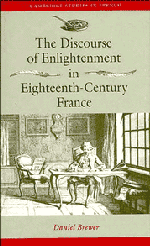Book contents
- Frontmatter
- Contents
- List of illustrations
- Acknowledgments
- Introduction
- 1 Representing knowledge: reading the Encyclopédie
- 2 Enlightenment critique and Diderot's art of philosophizing
- 3 The matter of judgment and the art of phrasing sensation
- 4 Critical narratives: Diderot's Salons
- 5 Embodying knowledge
- 6 Portraying Diderot: the aftermath
- 7 Interpreting Diderot: critical values, critical violence
- Notes
- Index
- Cambridge Studies in French
1 - Representing knowledge: reading the Encyclopédie
Published online by Cambridge University Press: 23 November 2009
- Frontmatter
- Contents
- List of illustrations
- Acknowledgments
- Introduction
- 1 Representing knowledge: reading the Encyclopédie
- 2 Enlightenment critique and Diderot's art of philosophizing
- 3 The matter of judgment and the art of phrasing sensation
- 4 Critical narratives: Diderot's Salons
- 5 Embodying knowledge
- 6 Portraying Diderot: the aftermath
- 7 Interpreting Diderot: critical values, critical violence
- Notes
- Index
- Cambridge Studies in French
Summary
L'étrange machine qu'une langue.
DiderotLa Science n'est donc pas autre chose que la Grammaire, historique et comparée, afin de devenir générale, et la rhétorique.
MallarméThe utility of myths
Conceived initially in 1745 as a business venture consisting of a two-volume translation of Ephraim Chambers' Cyclopedia of 1728, the Encyclopédie project had already outstripped all original plans by the time the first volume of articles appeared in 1751. When completed a quarter-century later, this monumental work comprised twenty-eight folio volumes containing 71,818 articles and 2,885 plates. Five subsequent editions were printed in Switzerland and Italy before 1789; roughly one-half of these 25,000 copies went to readers in France. Judged in terms of its innovative approach to the compilation and transmission of knowledge, the financial and technical means marshalled, the size of its readership (some 4,500 subscribers), and the number of its eventual collaborators (over 150 identified), the Encyclopédie project stands as one of the greatest exploits in the history of French culture and modern capitalism. The Encyclopédie is also the text most representative of the French Enlightenment, providing massive testimony to the Enlightenment belief in the value of unfettered inquiry into all sectors of human knowledge. Helping to consolidate the Enlightenment as a movement of intellectual and social reform, the Encyclopédie contributed as much to the change of ideas during the last decades of the Ancien Régime as to the exchange of capital.
A scale model of Enlightenment, this monumental work is doubly representative of Enlightenment in that it constitutes an event that can be understood in both epistemological and social-cultural terms.
- Type
- Chapter
- Information
- The Discourse of Enlightenment in Eighteenth-Century FranceDiderot and the Art of Philosophizing, pp. 13 - 55Publisher: Cambridge University PressPrint publication year: 1993



